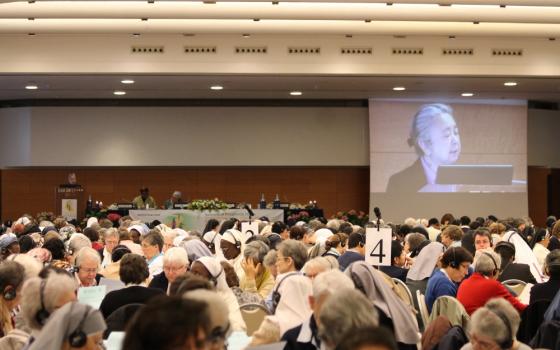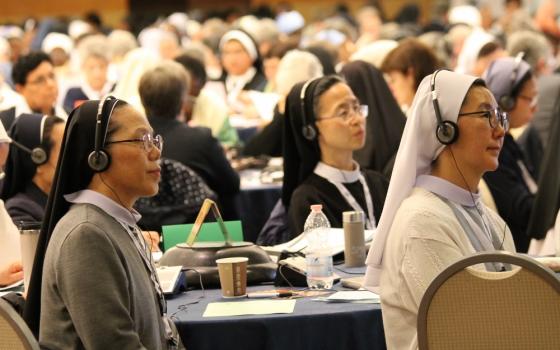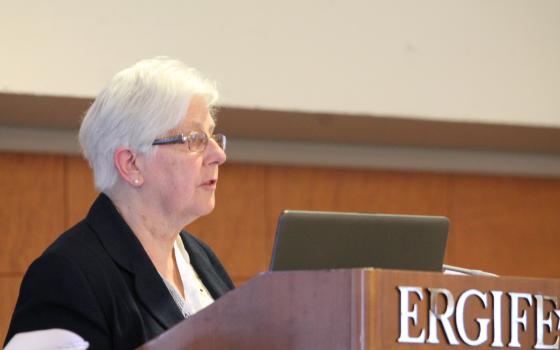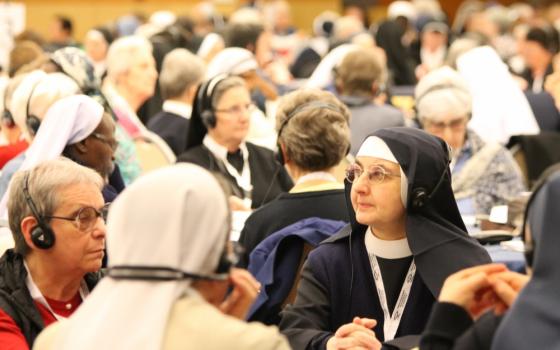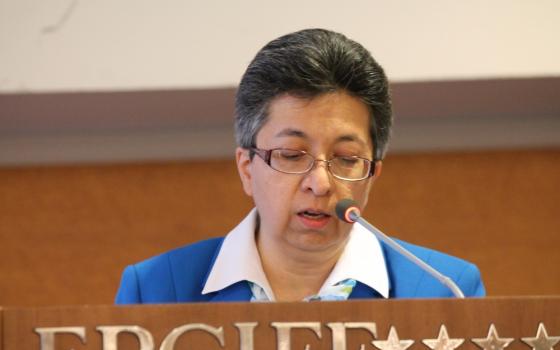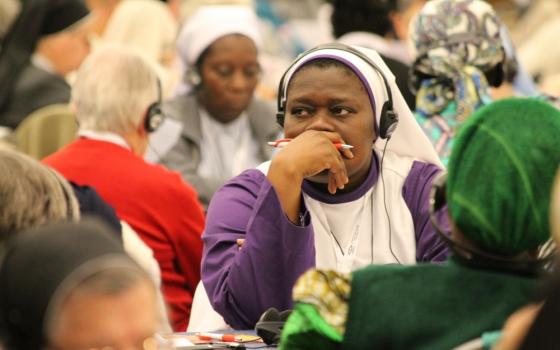Catholic sisters have a unique opportunity and responsibility to lead efforts to curb climate change and environmental degradation as individuals, communities and a network of congregations worldwide, Franciscan Sr. Sheila Kinsey told about 850 superiors general of women religious congregations gathered May 7 in Rome during the second day of the International Union of Superiors General's plenary assembly.
Kinsey outlined steps taken since June 2018, when UISG launched the campaign Sowing Hope for the Planet to share environmental practices many communities have adopted for decades and efforts of women religious who are putting Pope Francis' encyclical Laudato Si' into practice.
"As international congregations, we need to look at the ways we have been guilty of environmental destruction and disregard for these consequences to one another and especially to the poor," said Kinsey, who is executive co-secretary of the Justice, Peace and Integrity of Creation Commission (JPIC), a joint project of UISG and the Union of Superior Generals, the umbrella group of the world's men religious.
Sisters live and minister both in countries where lifestyle contributes to the rise in temperatures and in regions where climate change has the strongest effects.
"Our communities are both intimate with the cause and effect," she said. "With our personal commitment to one another, we are ideally positioned to respond compassionately in an integrated effort."
The presentation was among the sessions under the overall theme Sowers of Prophetic Hope for the triennial UISG assembly, which gathered leaders of congregations from 80 countries representing more than 450,000 women religious around the world.
Sowing Hope for the Planet, which has a website in six languages*, collects examples of congregations' environmental practices and serves as a resource base and platform for webinars on environmental topics such as the interconnectedness of Earth and people who are poor. The campaign is a collaborative effort with the JPIC Commission and the Global Catholic Climate Movement.
At the assembly May 7, sisters were asked to appoint a contact person for their congregations to broaden support for the campaign and were encouraged to take action, such as engaging in the synod on the Amazon in October, advocating for the rights of indigenous people, divesting congregational investments in fossil fuels and into alternative energy projects, observing various environmental awareness days and supporting youth involvement in Sowing Hope for the Planet.
Kinsey, a member of the Franciscan Daughters of the Sacred Heart of Jesus and Mary, said the hope is the campaign will become a platform to bring together sisters' work globally, providing an opportunity to raise a united voice.
"Designated power structures usually are given the bigger say in what is happening and, often, [is] the loudest voice," she said. "UISG is a unifying voice for the sisters around the world. Through this campaign, we have the opportunity to organize the voice of the sisters in the effort on many levels of structures in order to enhance and recognize our contribution to the care of our common home."
Sowing Hope for the Planet is an example of an initiative UISG has undertaken since its last assembly in 2016. On May 6, the plenary's opening day, Sr. Carmen Sammut, who is finishing her second and final term as UISG president, and executive secretary Sr. Pat Murray gave a joint presentation on the organization's efforts since then, reiterating accomplishments noted in a March letter from Sammut to UISG members.
During this year's assembly, UISG will celebrate the 10th anniversary of the founding of Talitha Kum, the worldwide network of consecrated persons against human trafficking, Sammut said in the letter. Talitha Kum grew out of the 2003 assembly and is an example of the role of UISG and its assemblies in deepening religious life and ministries, she said. It was launched in 2009.
UISG's role and profile has risen in recent years, said Sammut, the superior general of the Missionary Sisters of Our Lady of Africa.
"We are increasingly called on to participate in meetings, and we are consulted on important matters that arise," she wrote in the letter. "In addition we have contributed to recent Synods through the representatives nominated by UISG and written submissions."
Abuse and challenges
In light of the ongoing abuse scandal within the church, the executive board of UISG issued a statement condemning any abuse of power and the "necessity to form the members of our congregations so that relationships at every level are healthy, respectful and mutual," Sammut wrote in the letter. "It is important for us as leaders to speak up and to take appropriate action whenever and wherever needed."
UISG and USG issued a joint statement before Francis' February summit of the world's bishop conference presidents to discuss clergy sexual abuse, outlining ways religious can create a culture that safeguards children, she wrote.
UISG has responded to needs of its members by providing help with training formators and requests for canon law advice as well as focusing on intercultural community living, Sammut said. Use of webinars and other technology tools have enabled UISG to extend its training and reach.
Also on May 6, Sr. Teresa Maya, former president of the Leadership Conference of Women Religious and a Sister of Charity of the Incarnate Word, spoke of the future of religious life and its current challenges.
"Among all the different crises we are called to live and hope in, the one close to our hearts must be named from the start of this conference: the crisis in our church," she told plenary attendees. "History will judge how we responded to this crisis. One day, women religious will be either accomplices, or prophets or victims. We simply cannot sit this one out on the sidelines, even when we are being sidelined."
Noting the theme of the assembly, she explored how women religious can be "women of vision, seers of hope."
She said when she heard Sr. Veronica Openibo, leader of the Society of the Holy Child Jesus, address the Vatican summit on abuse, she was filled with hope.
"We all stood with her as she witnessed for women the world over," she said.
Maya called upon women religious to draw upon stories of female leaders and saints in the church and their congregations for inspiration.
"Our feminist legacy has a word of integrity to offer," she said. "Yes, I said it. Religious sisters should all be feminists, Christian feminists, who are committed to struggle and resist to ensure that women and men and children are all treated as human beings."
The assembly continues through May 10, concluding with an audience with Pope Francis and the celebration of Talitha Kum's 10th anniversary.
*An earlier version of this story gave an incorrect number.
[Joyce Meyer is a member of the Sisters of the Presentation of the Blessed Virgin Mary and is GSR's liaison to women religious outside of the United States. Gail DeGeorge is editor of Global Sisters Report. Her email address is gdegeorge@ncronline.org.]
